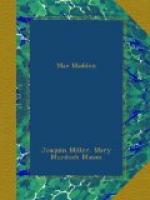“And the people all swore that there were two snakes coiled up in La Madre’s eyes then, and they hissed, and struck out with their fiery tongues, and the crowd fell on their knees, and the neighbors all set up a great shout of ‘La Madre Ilkana,’ so that they quite drowned the voice of the man with the big feather.”
“Is that all?” asked Mae, as Lisetta paused. “What did the soldiers do?”
“O, they hired a passing carriage to take the men whose horses were stolen back to Castellamare, and they all cantered off, without saying a word to La Madre, and when they had turned a corner of the road, she began to laugh. O, how she laughed! All the people laughed with her, and the children crowed and the dogs barked, for the rest of that whole day.
“And a neighbor who passed La Madre’s at midnight, said she was laughing out loud then.”
CHAPTER IX.
“Signorina.” Mae was passing down the long hall when she heard the whisper. She turned and saw Lisetta, with shining eyes and pink cheeks, standing at her side. Her pretty plump shoulders were only half covered, and the array of colors about her transformed her into a sort of personified rainbow. This was Lisetta’s Carnival attire, and very proud she was of it.
“Why, Lisetta, what do you want, and what makes you so happy?” called Mae.
“O, Signorina, the cousins are here,—and others,—all in mask. They fill Maria’s rooms quite full. It is very gay out there, and they all want to see you, Signorina. I have told them how well you speak Italian and how you love Italy, and to-night, they say, you shall be one of us. So come.” All this while Lisetta had been leading Mae swiftly down the corridor, until as she said these last words, she reached and pushed open the door. A great shout of laughter greeted Mae’s ear, and a pretty picture met her eyes—gaily decked youths and maidens clapping their hands and chattering brightly, while the padrona was just entering the opposite doorway, bearing two flasks of native wine, and some glasses.
“’Tis genuine Orvieto,” she called out, and this raised another shout. Then she caught sight of Mae and bowed low towards her. “Here is the little foreign lady,” she cried, and a dozen pairs of big black eyes were turned eagerly and warmly on Mae. She bowed and smiled at them, and said in pleading tones, “O, pray do not call me the ’little foreign lady’ now. Play I am as good an Italian as my heart could wish I were.”
This speech was received with new applause, and the padrona handed around the glasses saying: “We must drink first to the health of our new Italian. May she never leave us.”




